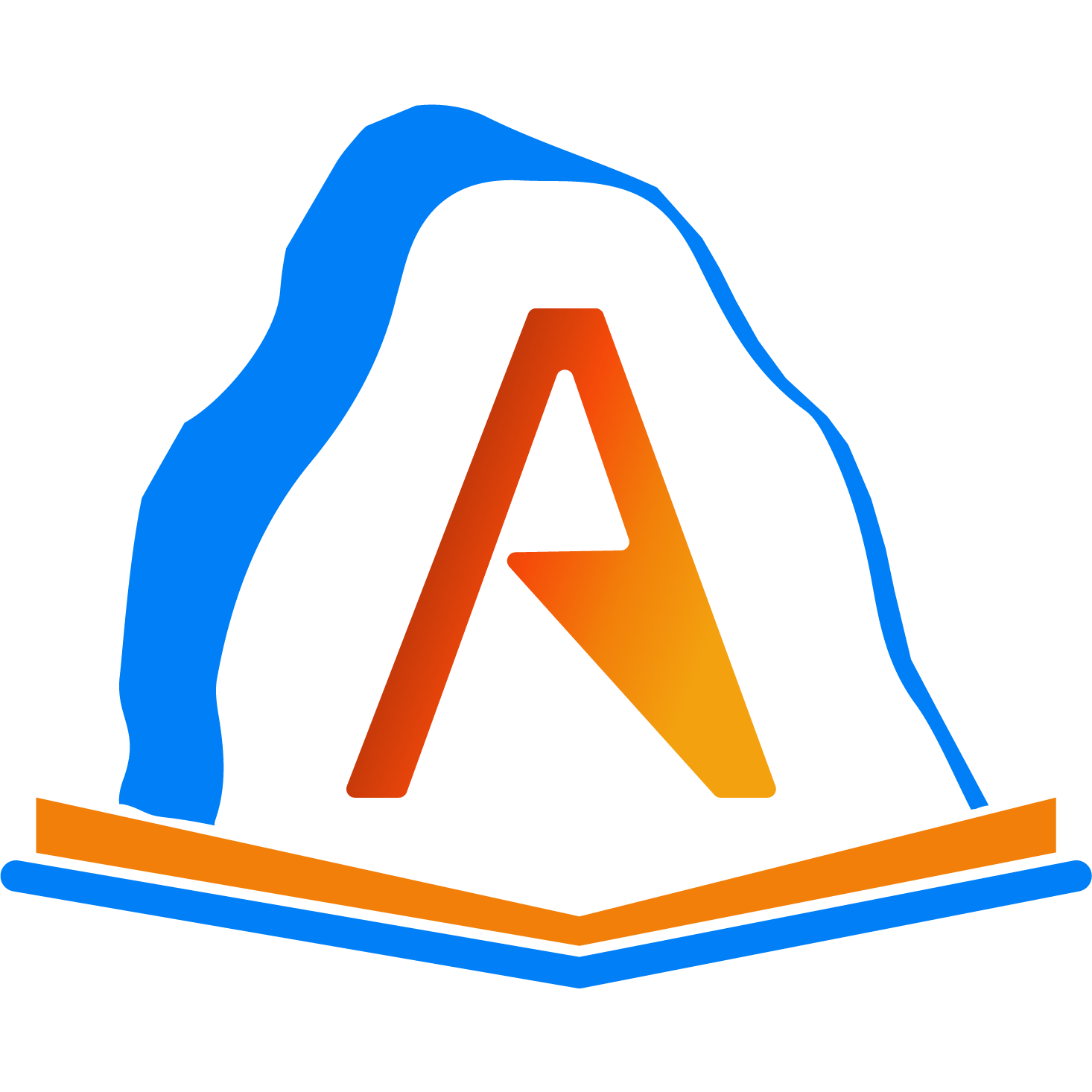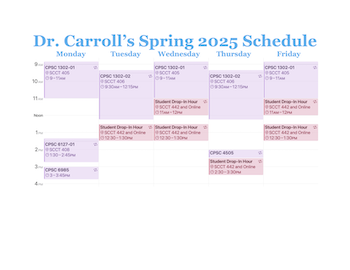Course Syllabus
Course Information
Course name and number: CPSC 1302K - Computer Science II
Semester and year: Spring 2026
Credit Hours: 4
Course Description: This course is the second in a two course sequence designed to introduce students to the fundamental concepts of computer science and programming. It focuses on the design of algorithms to solve problems and the implementation of those algorithms in the programming language Java. Students will learn to manipulate arrays, to implement inheritance and polymorphism, exception handling, and recursive programming.
Required Competencies/Prerequisites: CPSC 1301K with a "C" or better
Course Offering (days/times and room): 9:00 – 10:50 am Mondays, Wednesdays and Fridays in SCCT 405
Section: 01
Course Registration Number (CRN): 20637
Websites:
- The syllabus, course schedule, assignment descriptions, etc. are hosted at http://csc.ColumbusState.edu/carroll/1302/.
- Grades for each assignment, assignment submissions, quizzes, etc. are hosted in CougarVIEW.
The last day to drop without a grade and receive a 100% refund: Friday, January 16 2026
Instructor Information
- Name: Dr. Hyrum D. Carroll
- E-mail: carroll_hyrum@ColumbusState.edu
- Phone: (706) 507-8182
- Student Drop-in Hours:
I will keep the following Student Drop-In Hours. I will be both in my office and available online. I can also be available at other times by scheduling an appointment at https://drcarroll.youcanbook.me/. During my regular Student Drop-In Hours (if I don't have a meeting) you can start a video chat with me by clicking HERE.
Student Drop-In Hours Day Times Mondays 11:00 am – 12:00 pm
1:30 – 2:30 pmTuesdays 12:30 – 1:30 pm Wednesdays 11:00 am – 12:00 pm Thursdays 12:30 – 1:30 pm Fridays 11:00 am – 12:00 pm Walk-ins welcome and other times by appointment

Graduate Lab Assistant (GLA)
Textbooks and Materials
Required Textbooks
 Introduction to Programming with Java authored by Linda Seiter and Dan Palmer.
Introduction to Programming with Java authored by Linda Seiter and Dan Palmer.
An interactive textbook that even allows you to type in code and execute it on the same page as the material. Also, it has useful features like interactive quizzes and tracing of code execution. This textbook covers most of the topics for this class.
Cost: Free
Register here (Course Name: columbusstateuniversity_cpsc1302_spring2026a)
 Java, Java, Java: Object-Oriented Problem Solving (2024E Edition) by Ralph Morelli, Ralph Walde, Beryl Hoffman and David Cooper.
Java, Java, Java: Object-Oriented Problem Solving (2024E Edition) by Ralph Morelli, Ralph Walde, Beryl Hoffman and David Cooper.
Provides a detailed explanation of all of the topics covered in class.
Cost: Free
Register here (Course Name: columbusstateuniversity_cpsc1302_spring2026b)
Other Textbooks
Think Java
Cost: Free
Java for Python Programmers
Cost: Free
Provides an interactive environment that allows you to type in code and run them. Also has useful features like interactive quizzes and tracing of code execution.
Introduction to Programming Using Java (Eighth Edition) by David J. Eck
Cost: Free
Java with BlueJ (Parts 1 & 2) by Ron McFadyen
Cost: Free
Modules
- Orientation
- Introduction to Java
- Java Objects & Classes
- Debugging & User Interfaces
- Java Language and Structures
- Inheritance & Polymorphism (& Abstract Classes and Interfaces)
- Arrays & Generics
- Exception Handling
- File I/O
- Recursion
Course Learning Outcomes
- The students will demonstrate the ability to read moderately complex programs written in a specific programming language and understand what these programs do.
- The students will demonstrate the ability to design algorithms utilizing the principles of object-oriented programming (classes, encapsulation, inheritance mechanisms, polymorphism) to solve moderately complex problems.
- The students will demonstrate the ability to design algorithms utilizing some principles of programming (exception handling and recursive programming) to solve moderately complex problems.
- The students will demonstrate the ability to write moderately complex programs in a specific programming language to implement these algorithms.
- The students will demonstrate the ability to follow specified style guidelines in writing programs, and understand how the guidelines enhance readability and promote correctness in programs.
- The students will demonstrate the ability to edit, compile, debug and run programs in a specific programming language.
Activity Expectations and Assignment Requirements
Attendance
I expect each student to be in attendance for each class in-person. Attendance will be calculated by your arrival and duration in class. It is your responsibility to make sure your attendance gets recorded correctly for every class meeting. If you can not make a class, please inform me and get the relevant materials from a classmate. For this course, attendance applies to both lecture and lab (the first and second meeting times each day).
Students that do not attend both of the first two lectures may be dropped from the course. For this course, excessive absences (the point at which you can be dropped from the course and assigned a WF (Withdrawal Failing)) is defined as missing the equivalent of two or more weeks of classes. Refer to the CSU Catalog (https://catalog.columbusstate.edu/academic-regulations/undergraduate-academic-regulations/) for more information on class attendance and withdrawal.
Computers are permitted in lecture for note taking and completing exercises. Other activities such as web surfing, stock trading, and social networking are inappropriate. Not only do they distract you but also others.
Attendance Bonus: Research shows a strong positive correlation between attending class and a good grade in that class.
To make that correlation even more positive, the following attendance bonus is offered.
If a student attends each class, then their overall course grade will be increased by 1%.
If a student only misses the equivalent of one class, then 0.67% will be added; if a student only misses the equivalent of two classes, then 0.33% will be added.
No bonus will be applied for students missing the equivalent of three or more classes.
Note: University events with required attendance will not penalize your attendance bonus.
AI Policy
Artificial Intelligence (AI) tools, such as ChatGPT or Microsoft CoPilot, enable assistance in a variety of areas such as: brainstorming, outlining, learning, studying, code explanation of examples, practice questions, and understanding compilation errors. All of these areas are appropriate for this course (when used appropriately). Be aware that AI tools may not always be reliable. If you use an AI tool to assist with a graded assignment, include a statement like the following: "[AI tool name] was used in the preparation of this assignment. It was used in the following way(s): [e.g., brainstorming, outlining, grammatical correction] for [portion of the assignment]."
These same tools can also thwart learning by providing easy solutions. Consequently, using these tools for solution generation is not permitted. Providing instructions for an assignment, quiz or exam to AI tools is not allowed for this course. You cannot unsee what you have seen. Use of an AI tool to provide a solution for a graded assignment is considered an act of academic dishonesty.
Practice Assignments
You have the opportunity to complete several practice assignments this semester to help you learn and retain the techniques that you will learn.
Practice Assignment Late Policy
For the practice assignments hosted on zyLabs and CodeWorkout, you have one week after an assignment is due to turn it. For Finch robot practice assignments, there is a week of grace after the due date to submit them.
Projects
There will be about 4 projects. Projects must be written in Java. They are due at 10:00 PM Eastern Time on the assigned due date (unless indicated otherwise).
If an assignment contains portions that match other material (not provided by the instructor), zero points will be awarded.
Additionally, an Academic Misconduct incident may be reported as well.
Students missing two or more projects will receive an F or FA in this course.
It is recommended that you regularly keep a copy of your projects on a second device.
Project Late Policy
A total of at most 4 late days will be granted for the entire semester for projects (and only for projects). (Sunday and Monday are counted as 1 day late.) For example, if Project 2 is turned in two days late and Project 3 is also turned in two days late, then all of the late days for the semester have been used. Project late days are automatically applied based on when you submit. After the late days are exhausted, projects will be reduced by 20% per day late (again counting Sunday and Monday as 1 day).
Project Recap
In addition to the projects, you have the opportunity to recapitulate about one of the projects in a proctored environment (the same environment as the Exams).
Exams
There will be two exams during the regular semester. They will be proctored using Respondus LockDown Browser. It is known to not work with the following devices:
- Chromebooks
- iPads/tablets
- Android devices
- Smartphones
Final Exam Time
The final exam time, Monday, May 11, 2026, 8:00 – 10: am, will be used for presentations of the You Choose Team Projects.Grading
Grading category weights:
Each of the grading categories is capped at 100%.
| % Range | Course Grade |
|---|---|
| 90 – 100 | A |
| 80 – 89 | B |
| 70 – 79 | C |
| 60 – 69 | D |
| <60 | F |
Expectations
WHAT YOU CAN EXPECT FROM ME
- I will be prepared for lecture each day and will energetically present the material. I will ask questions to verify learning and understanding. I will answer all questions. They can be asked before class, during class, after class, via email or phone or during my Student Drop-in Hours (listed above).
- Below are my target response times:
Target Response Times Deliverable Target Email responses ≤ 2 school days Quizzes posted ≥ 4 days (so that it's open at least 3 days) Assignments posted ≥ 5 days before it's due Projects posted ≥ 7 days before it's due Quizzes graded ≤ 2 classes later Assignments graded ≤ 4 school days Discussion boards reviewed ≤ 5 school days Projects graded ≤ 7 days Exams graded ≤ 2 classes later
WHAT IS EXPECTED FROM YOU
Information regarding student rights and responsibilities can be found in the CSU Student Handbook.
As a student in this course, you are responsible to:
- Be respectful to both your peers and instructors in all interactions.
- Manage your time and maintain the discipline required to meet the course requirements.
- Be prepared to ask questions to maximize your understanding of the material.
- Complete all readings and watch all assigned videos,
- Complete all assignments,
- Complete all quizzes and exams,
- Ask questions when something is not clear.
- Actively participate in classroom discussions.
- Submit work that is completely your own creation and not author by someone or something else.
Time Commitment
The amount of time it will take you to complete the work for the course will depend on many factors, which will vary with each individual. The ACM recommends the following: "As a general guideline, the amount of out-of-class work is approximately three times the in-class time. Thus, a course that is listed as requiring 3 hours typically entails a total of 12 hours (3 in class and 9 outside)." Student in my classes typically spend more time than this guideline. Students will be expected to spend this time outside class reading the book, online materials and other materials; writing solutions to exercises and programming projects. It will be helpful to set aside regular study time when you can work uninterrupted.
Course Communication
- Use your official CSU account for all e-mail communication.
- Regularly check your official CSU email (at least every 36 hours).
- Follow common sense in writing and sending e-mail. As this course is a semi-public space, be cautious about sharing personal information such as your address or phone number.
- Read and think about e-mail before sending. Email is a permanent record of your communication.
- To help me prioritize responding to your email, please start the subject line with "CPSC 1302K-01: ".
Tutoring Help
Computer Science Tutoring
Tutoring hours are Monday through Thursday, 1:00 &emdash; 6:00 PM, and Fridays 1:00 AM &emdash; 4:00 PM. If you would like to come to tutoring in-person, you may do so in SCCT 450. Tutors are also available online during those same times. You can walk into the CS Tutoring lab and see if a tutor is available or you can visit the CougarVIEW course, Computer Science Online Tutoring for details about scheduling appointments. If you have questions about tutoring, please contact stone_jennifer2@columbusstate.edu.
Please note, a tutor's duty does NOT include doing your work for you. That would be a form of academic dishonesty. Your work is yours to complete. They are here to help when you get stuck, point you in the right direction, point out in the book where you can find the topics, explain a topic better, etc.
Academic Center for Tutoring (ACT)
The ACT at CSU offers the following services free for all enrolled CSU students:
- Appointment-based one-on-one or small group tutoring in a variety of core courses, writing help in all courses, and assistance with general study skills and online learning skills. Sessions can be online or face-to-face in the center located in Simon Schwob Memorial Library, second floor. Use Accudemia to make an appointment or contact the center for assistance.
- Drop-in math lab in the library basement (room 019) that is open for limited hours (see website for exact days/times).
- A limited amount of after-hours online tutoring through tutor.com. Access is through your courses in CougarVIEW.
Technical Requirements/ Support
See the CougarVIEW Starter Guide for support with navigating this system.
Hardware Requirements
See the System Checker here. (GeorgiaVIEW’s system checker is compatible with CougarVIEW.)
Software Requirements
- An office suite such as Microsoft Office or Open Office
- Microsoft Office 365 is available free to all CSU students through MyCSU.
- OpenOffice can be downloaded for free.
- Acrobat Reader offers additional features for PDF files.
Browser Plugins (.pdf files, QuickTime files, .mp4 files) can be obtained at a browser's website:
Privacy Policies
Below are the links to the privacy policies for the tools that we will be using in this course:CSU Institution-wide Policies
Academic Honesty
All students are expected to recognize and uphold standards of intellectual and academic integrity. Students should submit only the products of their own efforts for credit. Dishonest work will not be accepted for academic credit. Refer to the CSU Student Handbook (2024–2025) for the full policy.
ADA and 504 Statement
Columbus State University provides reasonable accommodations under the ADA and Section 504. Contact the Center for Accommodation and Access (Schuster Student Success Center, Room 102, (706) 507-8755, caa@columbusstate.edu) as early as possible to begin this process.
Title IX Discrimination
Title IX prohibits harassment and discrimination based on sex, including sexual misconduct and pregnancy-related conditions. For concerns, contact:
- Title IX Coordinator: Sarah Secoy – secoy_sarah@columbusstate.edu – (706) 507-8755
- Deputy Title IX Coordinator: Dr. Amber Dees – dees_amber@columbusstate.edu – (706) 507-8634
CougarVIEW Accessibility Statement
CougarVIEW (D2L Brightspace) is designed to support accessibility and meets WCAG 2.1 Level AAA standards and Section 508 compliance. Visit D2L Accessibility for more information.
CougarVIEW Privacy Statement
Read the CougarVIEW learning management system developer's (D2L Brightspace) privacy statement here.
Student Rights and Responsibilities
Information regarding student rights and responsibilities can be found in most current student handbook on the Resources for Students page.
